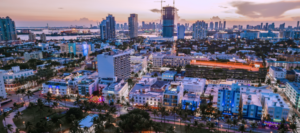Miami’s commercial real estate market, renowned for its dynamism and diversity, continues to attract investors seeking opportunities in various sectors. From retail spaces in bustling districts to office spaces in corporate hubs, the city offers a plethora of options for commercial real estate investors. In this blog post, we will delve into the pros and cons of commercial real estate investing in Miami, providing insights to help investors make informed decisions based on their specific goals.
Pros:
- Economic Growth: Miami’s robust economy serves as a significant pro for commercial real estate investors. The city’s strategic location as a gateway to Latin America, coupled with a thriving tourism industry and a growing tech sector, contributes to a stable and expanding economic environment. Investing in commercial properties here can provide a solid foundation for long-term financial success.
- Diverse Market Opportunities: From the vibrant nightlife of South Beach to the corporate atmosphere of Brickell, Miami’s commercial real estate market is incredibly diverse. Investors can choose from a range of sectors, including retail, office, industrial, and hospitality, allowing for strategic portfolio diversification.
- International Appeal: Miami’s cosmopolitan atmosphere and status as an international business hub make it an attractive destination for global investors. The city’s cultural diversity and reputation as a financial gateway to Latin America create a unique appeal for businesses looking to establish a presence in the United States.
- Tourism and Hospitality Sector: With its beautiful beaches and world-famous attractions, Miami is a hotspot for tourism. This presents a lucrative opportunity for investors interested in the hospitality sector. Hotels, resorts, and vacation rentals in prime locations can generate significant returns, especially during peak tourist seasons.
Cons:
- Market Volatility: While Miami’s real estate market has historically shown resilience, it is not immune to economic downturns and market fluctuations. Commercial real estate investors should be prepared for periods of volatility and have strategies in place to navigate challenging economic conditions.
- Hurricane Risk: As a coastal city, Miami is susceptible to hurricanes and tropical storms. This poses a risk to commercial properties, particularly those located in flood-prone areas. Investors need to factor in the costs of insurance and implement robust risk management strategies to protect their assets.
- Zoning and Permitting Challenges: Navigating the complex zoning and permitting regulations in Miami can be a challenge for commercial real estate investors. Understanding local laws and regulations is crucial to avoiding delays and complications in property development and renovations.
- Competition and Pricing: Miami’s popularity among investors has led to increased competition and, in some cases, higher property prices. Finding undervalued or strategically located properties may require a more extensive search and careful negotiation to ensure favorable investment terms.
Commercial real estate investing in Miami offers a myriad of opportunities for those willing to navigate the market’s complexities. While the city’s economic growth, diverse market options, international appeal, and tourism sector present significant advantages, investors must also be mindful of market volatility, hurricane risks, regulatory challenges, and competitive pricing. A well-informed and strategic approach, coupled with thorough due diligence, can empower investors to capitalize on Miami’s thriving commercial real estate market and build a robust and diversified portfolio.











